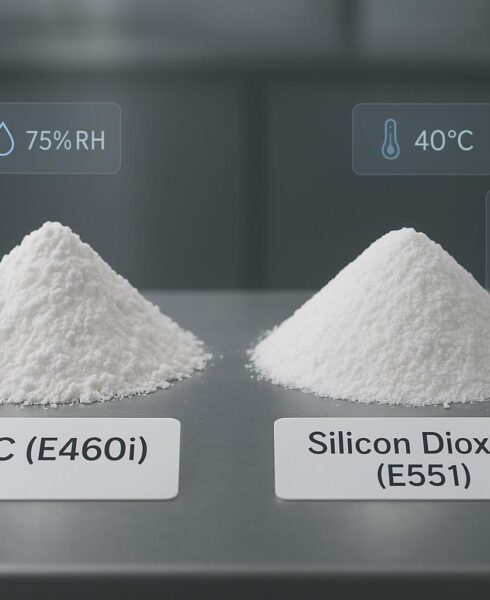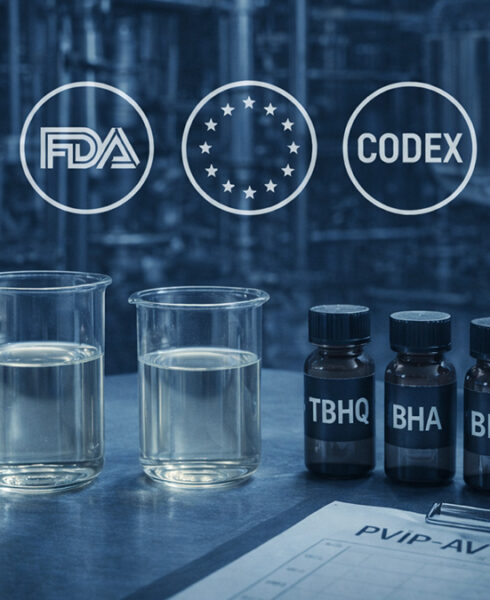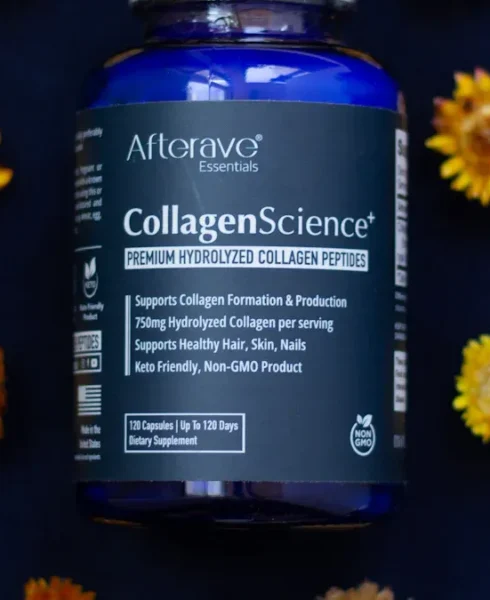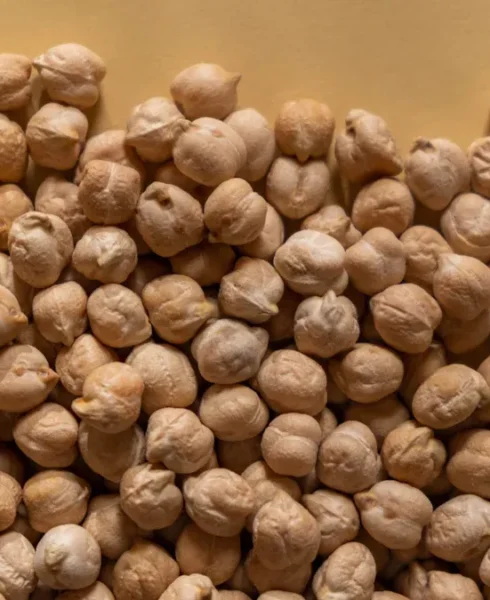When comparing plant vs whey protein, both support fitness goals effectively. Your choice depends on your priorities for muscle growth, weight loss, and personal needs. Whey protein is absorbed quickly by the body and provides all nine essential amino acids, making it ideal for muscle growth right after exercise. On the other hand, plant-based protein offers a variety of nutrients and supports a lifestyle that’s better for the planet. It’s important to consider how your body reacts to each type and any dietary restrictions you may have. Many athletes prefer whey protein for rapid muscle gains, while others opt for plant-based protein for its health benefits and sustainability.
Tip: For fast muscle recovery, whey protein is the best choice. If you prioritize environmental impact and balanced nutrition, plant-based protein is a smart option.
Key Takeaways
-
Whey protein goes into your body fast and has all the important amino acids. This helps muscles grow and heal quickly.
-
Plant-based protein gives you more fiber and nutrients. It is good for people with food sensitivities. It is also better for the planet.
-
Mixing different plant proteins gives you all the amino acids you need. This is like what whey protein does for your muscles.
-
Both types of protein can help you lose weight. They help you feel full. Plant protein has fiber, which may help you stay full longer.
-
Pick your protein based on your fitness goals and diet needs. Think about taste and how your body feels with each type.
Plant vs Whey Protein Overview
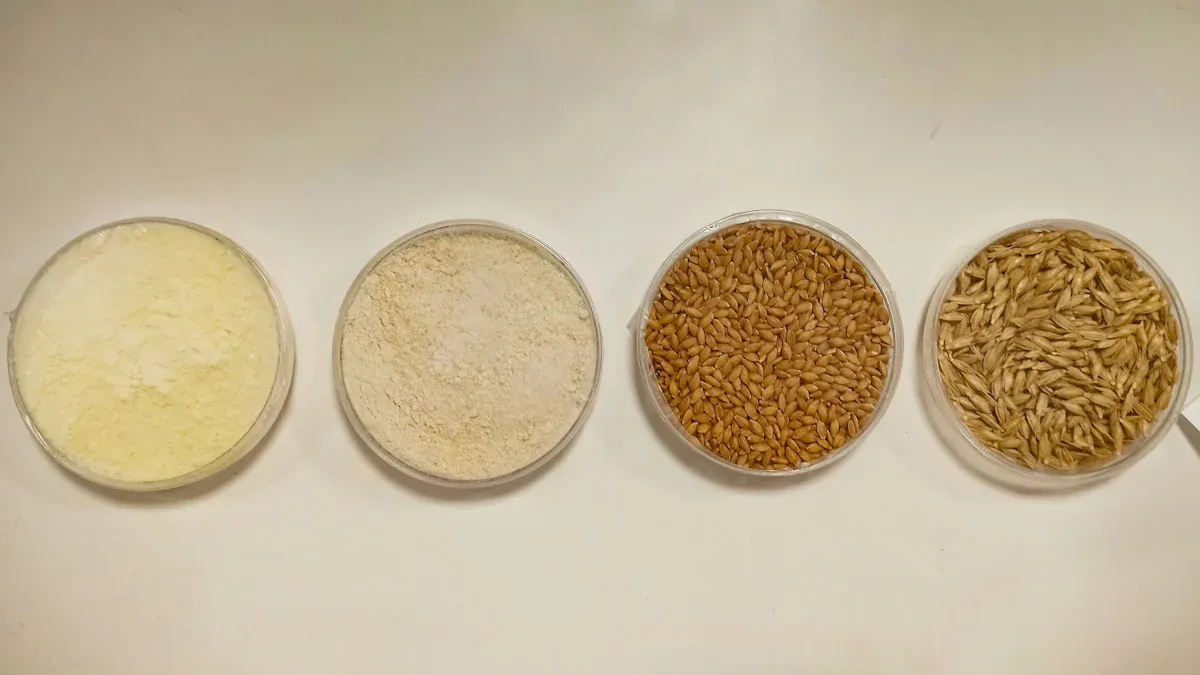
What Is Whey Protein?
Whey protein comes from milk when cheese is made. When cheese forms, a liquid called whey is left over. Factories clean and dry this liquid to make whey protein powder. You can buy whey protein as concentrate, isolate, or hydrolysate. Each type has different amounts of protein, fat, and lactose. Whey protein is a complete protein. It gives your body all nine essential amino acids. Many athletes use whey protein to help muscles recover fast. This is because your body can use it quickly.
What Is Plant-Based Protein?
Plant-based protein is made from things like peas, brown rice, soybeans, and hemp seeds. Companies take out the protein from these plants using special steps. Some plant protein powders, like soy, have all the amino acids you need. Others, like pea or brown rice protein, might miss one or two amino acids. You can mix different plant proteins to get all the amino acids. Plant-based protein often has extra nutrients like fiber and healthy fats. These help keep your body healthy.
Key Differences
There are some big differences between plant and whey protein. Whey protein is used by the body very fast. This makes it great for muscle recovery after exercise. Plant-based protein takes longer to absorb. But it gives you more nutrients and is good for people with sensitive stomachs or special diets. If you cannot have lactose, plant protein is a better pick. Whey protein usually costs less than plant-based powders. But plant-based protein is good for vegans and is better for the planet.
Note: The table below shows the main differences between these protein supplements.
|
Aspect |
Whey Protein |
Plant-Based Protein |
|---|---|---|
|
Source |
Comes from plants like peas, rice, soy, hemp |
|
|
Absorption Rate |
Fast |
Slower |
|
Amino Acid Profile |
Complete, high in BCAAs |
Changes; some are missing parts, can mix sources |
|
Digestibility |
Might have lactose |
No lactose, often easier to digest |
|
Suitability |
Not vegan, may bother people who can’t have lactose |
Vegan-friendly, good for sensitive stomachs |
|
Cost |
Usually costs less |
Often costs more |
Think about your fitness goals, diet needs, and what you like best to choose the right protein supplement.
Nutrition
Amino Acid Profile
Your body needs nine essential amino acids to build muscle. Whey protein has all of these amino acids. It also has a lot of BCAAs, like leucine. This makes whey protein very good for you. Most plant proteins, like pea or rice, do not have every amino acid. But you can mix different plant proteins to get them all. Soy protein is special because it has every amino acid. Mixing plant proteins helps your muscles grow and makes the protein better.
Protein Content
Protein amounts are different in each brand and type. Whey protein powders usually have 20 to 25 grams per scoop. Plant-based protein powders have 12 to 21 grams per scoop. The amount depends on what is in the blend. You can see the differences in the table below:
|
Brand |
Protein per Serving (g) |
Serving Size (g) |
Notes |
|---|---|---|---|
|
Orgain |
21 |
46 |
Blend of pea, brown rice, chia |
|
NOW Sports Organic Pea |
12 |
23 |
Pea protein isolate |
|
Momentous AbsoluteZero |
20 |
37 |
Pea and rice protein blend |
|
Garden of Life |
15 |
22 |
Blend of pea, navy bean, lentils, etc. |
|
OWYN |
20 (2 scoops) |
36 (2 scoops) |
Blend of pea, pumpkin, chia, veggies |
|
Tone It Up |
15 |
23 |
Blend of pea protein isolate, pumpkin |
|
Amazing Grass Protein Superfood |
20 |
31 |
Blend of quinoa, hemp, chia, pea |
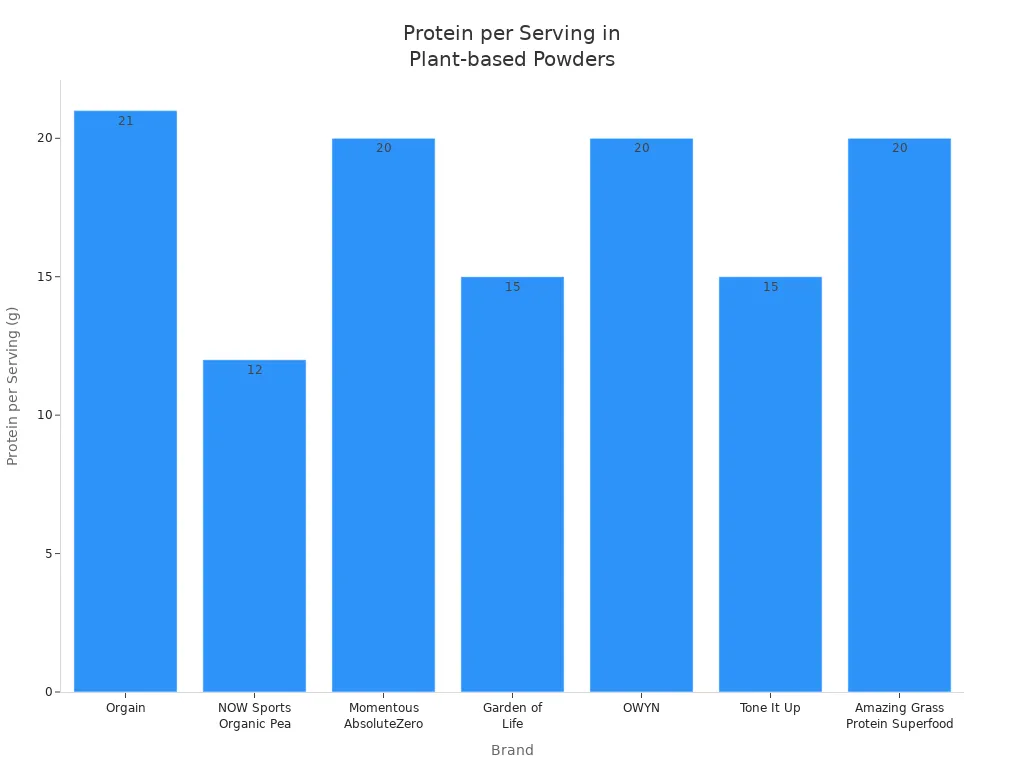
Always check the label to see how much protein is in each scoop. Some plant protein powders use blends to add more protein and balance the amino acids.
Fiber and Micronutrients
Plant-based protein powders give you more than just protein. They have fiber, which helps your stomach and keeps you full. Many plant protein blends also have vitamins and minerals. These include iron, magnesium, and potassium. Whey protein does not have much fiber or extra nutrients. If you want a supplement that helps your whole body, plant protein is a good pick. You can use plant protein to get more nutrients and try new foods.
Tip: Pick a plant-based protein blend if you want more fiber and vitamins in your shake.
Muscle Building
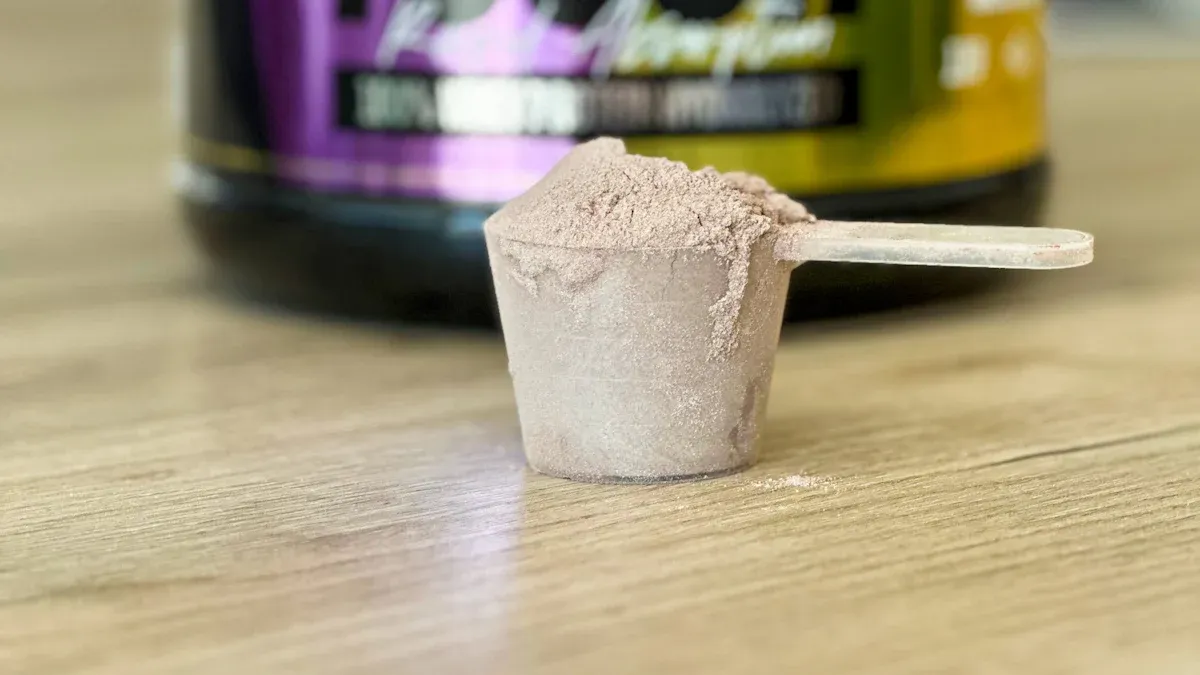
Muscle Recovery
You want your muscles to heal fast after you work out. Quick healing lets you train again soon and helps your muscles grow. Whey protein is well known for helping muscles fix themselves fast. Your body takes in whey protein quickly. This means it brings amino acids to your muscles right when they need them. That is why many athletes pick whey protein to help build lean muscle and feel less sore.
Plant-based protein can also help your muscles heal. A big review looked at 24 studies. It found that plant protein blends, with at least 30 grams of protein and enough leucine, can help muscles heal as well as whey protein. When you use a mix of plant proteins, you give your body different amino acids. These help your muscles grow and heal. If you use just one plant protein, like only pea or rice, it might not work as well. Mixing them gives better results for lean muscle and healing.
Tip: For the best muscle healing, try to get at least 30 grams of protein in each serving. Look for blends that have enough leucine.
Protein Synthesis
Muscle protein synthesis is how your body builds new muscle. This process is very important for muscle growth. The kind of protein you pick changes how well your body can use it to build muscle.
Whey protein has all the amino acids your body needs. It has a lot of leucine, which starts muscle building. Your body uses whey protein fast. This makes it great for building lean muscle after you exercise. Many athletes use whey protein because it helps them grow muscle and reach their protein goals.
Plant-based proteins can also help your body build muscle. The results depend on the type of plant protein. Blends, like pea and rice together, can work as well as whey protein if you get enough leucine. Some single plant proteins may not work as well. One study compared muscle building after eating beef protein and plant protein. The table below shows what happened:
|
Parameter |
Omnivorous Meal (Beef Protein) |
Plant-Based Meal (Vegan Protein) |
Statistical Significance |
|---|---|---|---|
|
Protein intake (g/kg body mass) |
0.45 |
0.45 |
Isonitrogenous |
|
Plasma essential amino acid concentration |
87 ± 37 mmol·6 h/L |
38 ± 54 mmol·6 h/L |
P-interaction < 0.01 |
|
Postprandial muscle protein synthesis rate |
0.052 ± 0.023 %/h |
0.035 ± 0.021 %/h |
P = 0.037 |
|
Relative increase in muscle protein synthesis |
Reference |
Paired t-test |
This study shows animal proteins can sometimes help build muscle faster than plant proteins. But if you use plant protein blends with enough leucine, you can still help your muscles grow. You should focus on getting enough protein each day and picking good sources.
-
To help your muscles grow:
-
Use whey protein for quick use and lots of leucine.
-
Pick plant protein blends with at least 30 grams of protein and 2.5–3 grams of leucine.
-
Make sure you get enough protein each day for muscle growth.
-
Note: Both whey protein and plant blends can help you reach your muscle goals if you pay attention to how much and what kind of protein you eat.
Weight Loss
Satiety and Appetite
It is important to feel full when you want to lose weight. Both plant-based and whey protein can help you control hunger, but they do this in different ways. Eating more protein often makes you feel less hungry. This can help you follow your weight loss plan.
Scientists have looked at how different proteins affect hunger. In one study, people who took pea protein or micellar casein felt less hungry for four hours than those who took soy protein. Pea protein and casein also raised peptide YY, a hormone that helps you feel full. Whey protein did not lower hunger as much as the others, but it still helped some people feel satisfied.
|
Protein Source |
Effect on 4-hour Appetite (mm*240 min) |
Effect on Peptide YY Concentration (pg/mL*240 min) |
Effect on Subsequent Ad Libitum Energy Intake |
|---|---|---|---|
|
Micellar Casein (CAS) |
Significant reduction (-3330 ± 690) vs Soy |
Significant increase (3520 ± 84) vs Soy |
No significant difference |
|
Pea Protein Isolate (PEA) |
Significant reduction (-2840 ± 930) vs Soy |
Significant increase (3860 ± 864) vs Soy |
No significant difference |
|
Whey Protein Isolate (WHEY) |
No significant difference (-2290 ± 930) vs others |
No significant difference (3870 ± 932) vs others |
No significant difference |
|
Soy Protein Isolate (SOY) |
Least appetite reduction (-1440 ± 936) |
Lowest peptide YY (2200 ± 869) |
No significant difference |
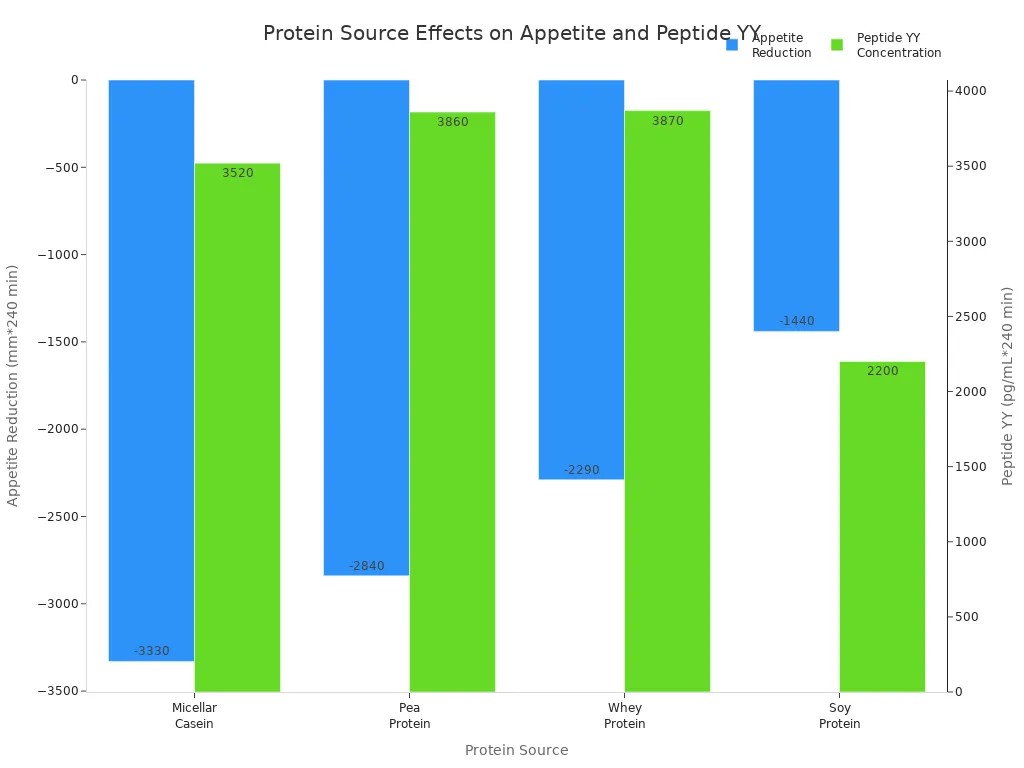
Eating more protein, like whey protein, can help you lose weight by making you feel full and less likely to eat more. Some studies show that people who eat more protein lose more fat and keep more muscle. But the effect on hunger is not very big, and you need to stick to your plan for the best results.
-
Eating more protein (1.2 to 1.6 g/kg/day) helps with weight and fat loss.
-
These diets help you keep muscle while losing weight.
-
Protein can help you eat less, but the effect is small.
-
Losing weight for a long time depends on sticking to your diet.
A 12-week study with people who were obese compared soy protein, whey protein, and a placebo. The results showed no big difference in weight loss between the groups. But people who took soy protein ate less food and fat, which could help with weight loss over time. You may need more time to see bigger changes in weight from plant protein.
Tip: To help control your hunger, try adding more protein to your meals. Both plant-based and whey protein can help, but you should pick the one that works best for you.
Calorie Content
When you pick a protein powder for weight loss, look at the calories. Most whey protein powders have about 100 to 130 calories per scoop. Plant-based protein powders can have 90 to 150 calories per scoop, depending on what is in them.
Pick a protein powder that fits your daily calorie needs. If you want to lose weight, you need to eat fewer calories than you use. Protein helps you keep muscle while you lose fat. Some plant-based protein powders have more fiber, which can help you feel full with fewer calories.
Here are some things to think about when looking at calories for weight loss:
-
Whey protein usually has less carbs and fat, so it often has fewer calories per scoop.
-
Plant-based protein blends may have more fiber and healthy fats, which can add calories but also help you feel full.
-
Always check the label for serving size and calories per scoop.
-
Stay away from protein powders with added sugar, as these can add calories and slow your weight loss.
You can use both plant-based and whey protein to help with weight loss. The most important thing is to pick a product that matches your calorie goals and helps you feel full. Remember, the best results come from eating healthy foods and exercising often.
Note: Protein supplements alone will not make you lose weight. You need to use them with healthy eating and exercise for the best results.
Digestibility
Absorption Rate
How fast your body takes in protein is important. Whey protein is digested and absorbed very quickly. Studies show animal proteins like whey are easier to digest than plant proteins. Whey protein’s structure helps your body break it down fast. This lets your muscles use it soon after you drink it. Quick absorption helps your muscles grow and recover after exercise.
Plant-based proteins, like pea or rice, move slower in your body. Their fiber and structure slow down how fast you use them. Some companies change plant proteins to make them easier to digest. But whey protein is still the fastest for absorption. If you want quick results after working out, whey protein is a good choice.
Note: Fast absorption gives your muscles amino acids when they need them most.
Digestive Comfort
It is important to feel good after using protein powder. Both whey and plant-based protein can upset your stomach sometimes. Here are some things you may notice:
-
Plant-based proteins with pea protein or sugar alcohols can cause gas and bloating. This happens more if you have IBS or are sensitive to FODMAPs.
-
Some vegan protein powders might have heavy metals like arsenic or lead.
-
Whey protein can cause constipation, diarrhea, bloating, or nausea. This is common if you cannot handle lactose.
-
Whey protein isolate has less lactose but may still bother people who are very sensitive.
-
Both types can cause allergies. Whey protein may cause dairy allergies. Some plant proteins may cause nut or soy allergies.
If you have stomach problems, try these steps:
-
Use digestive enzymes like protease or lactase to help break down protein and stop bloating.
-
Start with half a serving and slowly use more as your body gets used to it.
-
Write down what kind and how much protein powder you use, and note any symptoms.
-
If you get diarrhea, drink water and watch for serious signs.
-
If problems do not go away, stop using the powder for a day and try something else, like tofu or boiled chicken.
-
Add the powder back slowly, starting with a small amount.
-
See a doctor if you feel sick for more than three days or if you see blood or have strong pain.
Tip: Pay attention to how you feel. If you have stomach pain, change your serving size or try a new protein source.
Dietary Needs
Vegan and Vegetarian
If you are vegan or vegetarian, you do not eat animal products. Whey protein is not for you because it comes from milk. Plant-based protein is a better pick. You can get plant protein powders made from peas, rice, hemp, or soy. These choices help you get enough protein without using animal foods.
Many people pick plant-based protein for ethical reasons. They care about animals and the planet. Plant protein is often hypoallergenic. Many blends do not have common allergens like dairy, soy, gluten, or nuts. This makes them safe for people with food allergies or sensitivities.
Tip: To get all the amino acids, mix different plant proteins. For example, use both pea and rice protein to get every essential amino acid your body needs.
Lactose Intolerance
Lactose intolerance is very common around the world. About 65% of people have trouble digesting lactose after they are babies. If you have lactose intolerance, you might feel bloated, have stomach pain, or get diarrhea after eating dairy. Whey protein has lactose, especially in concentrate form. Some people can use whey protein isolate or hydrolysate because they have less lactose, but others still react to small amounts.
Plant-based protein does not have lactose. You can use plant protein powders without worrying about stomach problems from lactose. This makes plant-based protein a safe choice for people with lactose intolerance or milk allergies.
Here is a table that shows how common lactose intolerance is in different places:
|
Region/Ethnic Group |
Lactose Intolerance Prevalence |
|---|---|
|
Northern Europe |
~10% |
|
Africa |
70-100% |
|
South America |
70-100% |
|
Asia |
70-100% |
|
United States (Whites) |
15% |
|
United States (Mexican-Americans) |
53% |
|
United States (African-Americans) |
80% |
|
Europe overall |
~28% |
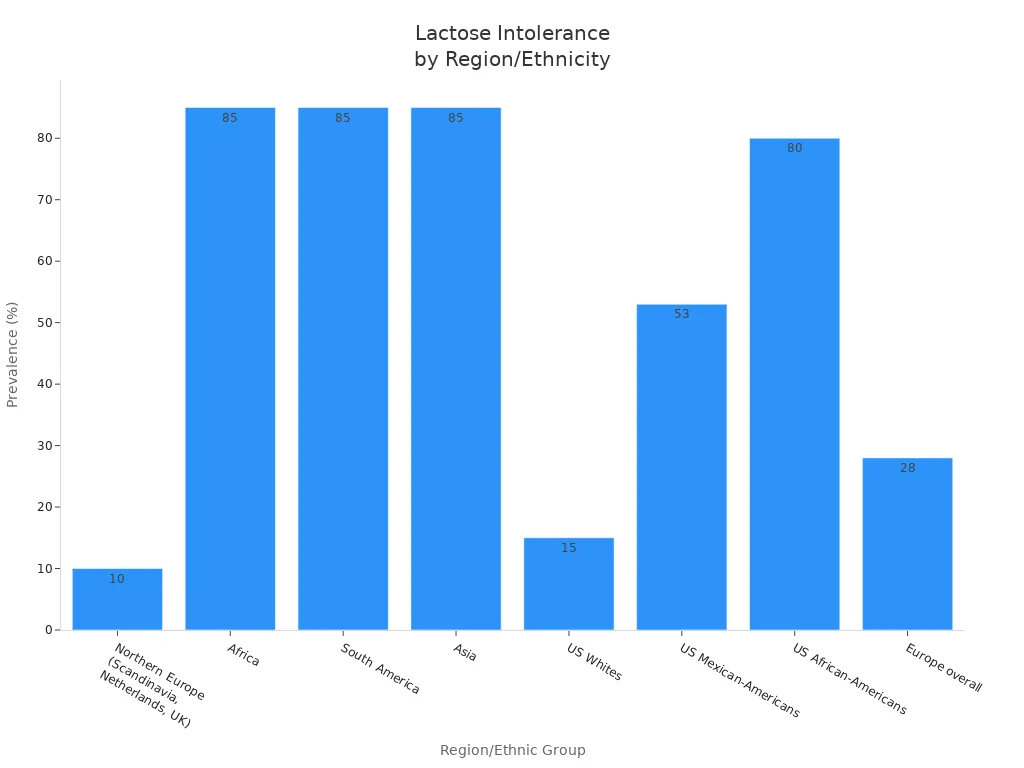
If you have lactose intolerance, always check the label on whey protein. Some people can handle a little, but others need to avoid it. Plant-based protein is a good and safe choice for you.
Note: If you are allergic to milk, you must not use whey protein. Plant protein is safe for most people with food allergies.
Sustainability
Environmental Impact of Plant-Based Protein
You may wonder how your protein choice affects the earth. Picking plant-based protein helps cut down on pollution and saves land. Studies show that peas, lentils, and soybeans use less energy than animal proteins. They also make less pollution. Choosing plant protein helps make food systems better for the planet. Making plant protein means growing crops, picking them, and turning them into powder. These steps use less water and energy than raising animals.
Plant-based protein is also easier on the environment. When you count the effects on air, water, and land, plant protein is a better pick. For each kilogram of protein, plant protein has a smaller impact than beef, lamb, or fish. You help save nature and cut down on pollution when you pick plant protein.
Tip: If you want to help the earth, plant-based protein is a smart choice.
Whey Protein Footprint
Whey protein comes from cows, so it affects the earth more. To make whey protein, farmers grow food for cows and take care of them. They also turn milk into powder. This uses more water and energy than making plant protein. Making one pound of whey protein needs more water than plant protein. The dairy business also makes more greenhouse gases. Raising animals for whey protein adds billions of tons of carbon dioxide every year.
Right now, making whey and plant protein uses about the same energy in factories. But if more people buy whey protein, the need for cheese goes up. This could make even more pollution. Plant protein does not have this problem. Its pollution stays low even if more people use it.
-
Whey protein uses more water and energy.
-
Plant protein helps you make less pollution.
-
Picking plant protein is better for the planet.
Note: If you care about the earth, plant-based protein is the best pick.
Choosing the Right Protein
Fitness Goals
Pick a protein that matches your fitness goals. If you want bigger muscles, you need all the amino acids and quick absorption. Whey protein gives you every essential amino acid. It has lots of leucine, which helps muscles heal and grow fast. Plant-based protein can help muscles too if you use blends like pea and rice or soy. These blends give you all the amino acids. If you want to lose weight, plant-based protein is helpful because it has fiber. Fiber helps you feel full and eat less food. Both types of protein can help you reach your goals. Always check the label for protein quality and completeness.
Here is a table to compare:
|
Fitness Goal |
Best Protein Type |
Key Features |
Why It Works for You |
|---|---|---|---|
|
Muscle Growth |
Whey Protein |
Supports fast muscle recovery |
|
|
Muscle Growth |
Plant Protein Blend |
Complete profile if blended, slower absorption |
Sustained amino acids for growth |
|
Weight Loss |
Plant-Based Protein |
Keeps you full, helps manage intake |
|
|
Weight Loss |
Whey Protein |
Fast absorption, complete protein |
Helps keep muscle while losing fat |
Tip: Getting enough sleep, eating the right amount, and exercising also help muscles grow. Protein works best when you have healthy habits.
Personal Preferences
Your taste and lifestyle are important when picking protein. Whey protein is creamy and tastes familiar. Many people like it in shakes. Plant-based protein comes in many flavors, like chocolate or fruit. You can pick what you like best. If you are vegan or cannot have lactose, plant-based protein is safe. It is often gluten-free and does not cause allergies. You might like plant protein if you want more fiber or have a sensitive stomach.
Try different protein powders to see which one you enjoy. Some people like how smooth whey protein is. Others like the choices with plant-based protein. Pick the one that makes your shake tasty and helps you stick to your plan.
-
Choose by:
-
Dietary needs (vegan, lactose intolerance, allergies)
-
Digestive comfort
-
Enjoyment and motivation
😊 Remember: The best protein is the one you like and that fits your life. Try different kinds to find your favorite.
You can use whey protein or plant-based protein to get fit. Whey protein helps muscles grow fast because your body uses it quickly. Plant-based protein helps muscles too if you eat enough and mix types. If you care about the earth or have special food needs, plant-based protein is a good pick. Both kinds help with losing weight and healing after exercise. Try both to see which one works for you. If you are not sure, talk to a nutrition expert.
Tip: Check this table to see the differences:
|
Goal |
Whey Protein |
Plant-Based Protein |
|---|---|---|
|
Muscle Growth |
Best for fast gains |
Works if combined well |
|
Weight Loss |
Effective |
Effective, adds fiber |
|
Dietary Needs |
Not vegan-friendly |
Vegan, allergy-friendly |
|
Sustainability |
Higher footprint |
Lower footprint |
FAQ
What is the main difference between plant vs whey protein?
You get whey protein from milk. Plant-based protein comes from sources like peas or soy. Whey protein absorbs faster and supports quick muscle recovery. Plant protein offers more fiber and micronutrients. Both types help with muscle growth and weight loss.
Can plant-based protein support lean muscle growth as well as whey protein?
Yes, you can build lean muscle growth with plant-based protein. You need to choose blends that offer a complete amino acid profile. Make sure your protein intake for muscle growth is high enough. Both protein powders help with muscle protein synthesis.
Is whey protein better for weight loss than plant protein?
Both whey protein and plant protein support weight loss. Whey protein absorbs quickly and helps with muscle recovery. Plant-based protein contains fiber, which keeps you full longer. You can use either type for effective weight loss.
How do I know if I am getting high-quality protein from my supplement?
Check the label for a complete amino acid profile. Whey protein is a high-quality protein. Plant-based protein blends can also offer high protein quality. Look for protein supplements with at least 20 grams per serving.
Do I need protein supplementation if I eat enough whole foods?
You may not need protein supplementation if you get enough protein from whole foods. Many people use protein powders for convenience. If you struggle to meet your protein intake for muscle growth, protein supplements can help.


